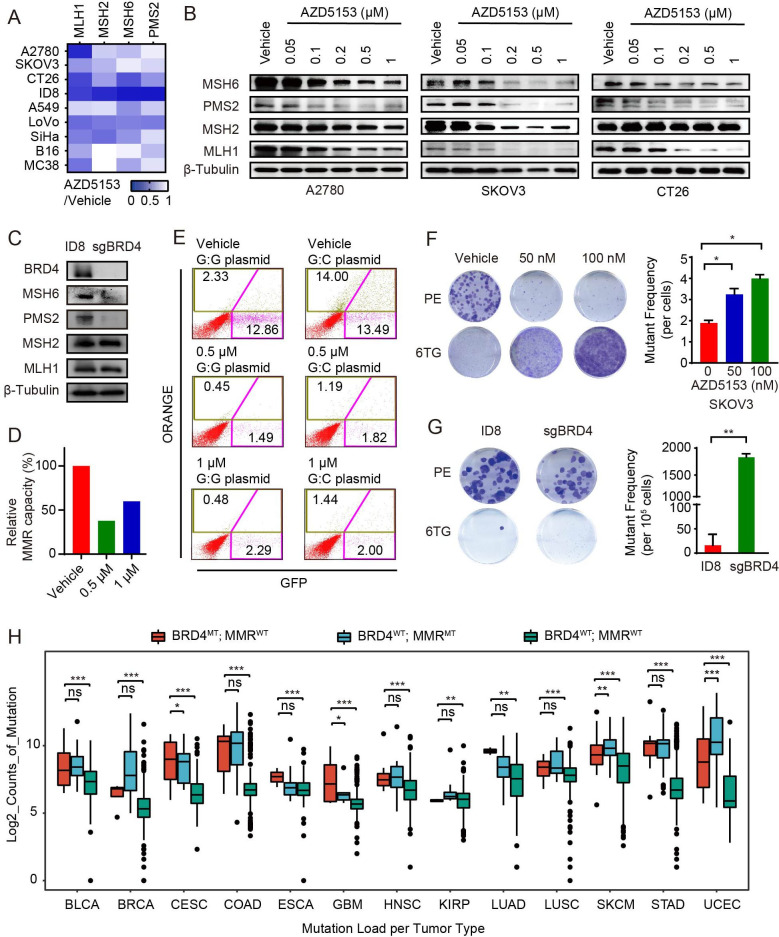Figure 2.
BRD4 inhibition downregulated MMR proteins and impaired MMR function in vitro (A) Heatmap showed relative expression changes of MLH1, MSH2, MSH6, and PMS2 by RT-qPCR in A2780, SKOV3, CT26, ID8, A549, LoVo, SiHa, B16, and MC38 cell lines treated with 1 µM AZD5153 for 48 hours. (B) Western blot of MLH1, MSH2, MSH6, and PMS2 proteins in A2780, SKOV3, and CT26 cell lines treated with the indicated doses of AZD5153 for 72 hours. (C) Western blot of BRD4 and MMR (MLH1, MSH2, MSH6, and PMS2) proteins in Brd4 knockout ID8 cells and the parental ID8 cells. (D) Relative MMR capacities in HEK-293 cells treated with or without the indicated dose of AZD5153. (E) Representative pictures for MMR capacities in (D). (F) Representative pictures (left) and mutant frequency (right) of mutability assay in SKOV3 treated with vehicle or the indicated dose of AZD5153. The mutant frequencies were derived from hypoxanthine-guanine phosphoribosyl transferase gene mutation (6-TG sensitivity) assay. The mutant frequency refers to the numbers of mutated clones after normalized by PE. PE, plating efficiency; 6-TG, 6-thioguanine-treated samples. (G) Representative pictures (left) and mutant frequency (right) of mutability assay for Brd4 knockout ID8 and the parental cells. (H) Mutation load (log2 mutation counts) in BRD4 mutant but MMR genes wild-type tumors (BRD4MT; MMRWT), BRD4 wild-type but MMR genes mutant tumors (BRD4WT; MMRMT), and BRD4 and MMR genes wild-type tumors (BRD4WT; MMRWT) from 15 cancer types based on The Cancer Genome Atlas data. MMRWT indicates that at least one of four MMR genes (MLH1, MSH2, MSH6 and PMS2) is mutant. Data is shown as median and quartile, two-tailed t-tests (*, p<0.05; **, p<0.01; ***, p<0.001) Data is shown as mean±SEM, two-tailed t-tests (*, p<0.05; **, p<0.01; ***, p<0.001) in F–G. RT-qPCR, quantitative reverse transcription PCR; BLCA, bladder urothelial carcinoma; BRCA, breast invasive carcinoma; BRD4, bromodomain containing 4; CESC, cervical squamous cell carcinoma and endocervical adenocarcinoma; COAD, colon adenocarcinoma; ESCA, esophageal carcinoma; GBM, glioblastoma multiforme; HNSC, head and neck squamous cell carcinoma; KIRP, kidney renal papillary cell carcinoma; LUAD, lung adenocarcinoma; LUSC, lung squamous cell carcinoma; MLH1, mutL homologue 1; MMR, mismatch repair; MSH2, mutS homologue 2; MSH6, mutS homologue 6; PMS2, PMS1 homolog 2, mismatch repair system component; SKCM, skin cutaneous melanoma; STAD, stomach adenocarcinoma; UCEC, uterine corpus endometrial carcinoma.

